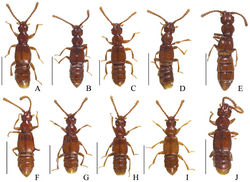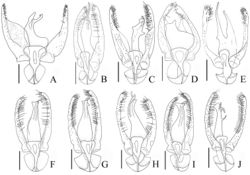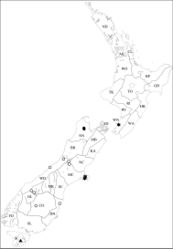Pseudoexeirarthra sungmini
| Notice: | This page is derived from the original publication listed below, whose author(s) should always be credited. Further contributors may edit and improve the content of this page and, consequently, need to be credited as well (see page history). Any assessment of factual correctness requires a careful review of the original article as well as of subsequent contributions.
If you are uncertain whether your planned contribution is correct or not, we suggest that you use the associated discussion page instead of editing the page directly. This page should be cited as follows (rationale):
Citation formats to copy and paste
BibTeX: @article{Park2015ZooKeys, RIS/ Endnote: TY - JOUR Wikipedia/ Citizendium: <ref name="Park2015ZooKeys">{{Citation See also the citation download page at the journal. |
Ordo: Coleoptera
Familia: Staphylinidae
Genus: Pseudoexeirarthra
Name
Pseudoexeirarthra sungmini Park & Carlton, 2015 sp. n. – Wikispecies link – ZooBank link – Pensoft Profile
Type material
Holotype. New Zealand: Nelson (NN): 1♂ (NZAC), aedeagus dissected and mounted in balsam on a clear plastic card, “NEW ZEALAND NN Mt Arthur/Flora Sdl Tck, c1400m 28-Nov-05”, “On mossy overhangs by gully. D Clarke, J Nunn”, “HOLOTYPE Pseudoexeirarthra sungmini Park and Carlton des. 2013”. Paratype (1 male): New Zealand: Nelson (NN): 1♂, Cobb, L. Sylvester, 1329 m, 31 III 1969, J. S. Dugdale, litter (NZAC).
Etymology
This species is named after Dr. Sung Min Boo, Professor of Biology, Chungnam National University (Daejeon, South Korea), world algal systematist and, an enthusiastic supporter of this study.
Diagnosis
This species is distinguished from other the species of this genus by the following combination of characters: body length 1.9–2.1 mm; eyes two-thirds length of temples (Fig. 1D); antennomeres 2–4 longer than wide, 5–7 subquadrate, 8–10 weakly transverse; median lobe of male genitalia divided, broadest near base, major lobe short with semicircular depression anteriorly, minor lobe triangular and longer (Fig. 3D); parameres symmetrical, setae limited to apical fourth (Fig. 3D); only known from Nelson (Fig. 5: black circles).
Description of male
Length 1.9–2.1 mm. Body reddish brown, antennae, legs, maxillary palpi and elytra paler (Fig. 1D). Head round, as long as wide, widest across eyes (Fig. 1D). Antennomere 1 approximately 1.5 times longer than wide, 2–4 longer than wide, 5–7 subquadrate, 8–10 weakly transverse. Eyes two-thirds length of temples. Prosternum as long as wide, widest at one-third length. Elytra longer than wide (Fig. 1D). Hind wings fully developed. Meso- and metaventrites trapezoidal, longer than wide. Tergite IV with pair of transverse patches of microtrichia reaching middle. Median lobe of genitalia divided, broadest near base, major lobe short with semicircular depression anteriorly, minor lobe triangular and longer (Fig. 3D). Phallobase symmetrical and rounded (Fig. 3D). Parameres nearly symmetrical, setae limited to apical fourth (Fig. 3D).
Distribution
Nelson (NN) (Fig. 5: black circles).
Habitat
Specimens were collected by sifting moss and leaf litter.
Original Description
- Park, J; Carlton, C; 2015: Pseudoexeirarthra, a new genus from New Zealand (Coleoptera, Staphylinidae, Pselaphinae), with descriptions of seven new species ZooKeys, (491): 95-118. doi


